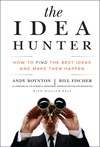THE IDEA HUNTER
 The Idea Hunter: How to Find the Best Ideas and Make them HappenISBN: 978-0-470-76776-4
Hardcover
192 pages
April 2011, Jossey-Bass
This is a Print-on-Demand title. It will be printed specifically to fill your order. Please allow an additional 10-15 days delivery time. The book is not returnable.
Learn more about this book
|
|||||||
THE IDEA HUNTER
In THE IDEA HUNTER: How to Find the Best Ideas and Make Them Happen (Jossey-Bass; hardcover; April 26, 2011), authors Andy Boynton and Bill Fischer, together with William Bole, challenge many assumptions about how great ideas are discovered and who discovers them. Drawing on their extensive research and experience as both prominent scholars and consultants, the authors show that outstanding business ideas do not spring from innate creativity or even necessarily from the minds of brilliant people. Rather, breakaway ideas come to those who are in the habit of looking for such ideas – all around them, all the time. According to the authors, such people do not buy into the starry-eyed notion that the only great idea is a pristinely original one. They understand that game-changing ideas are “already out there, waiting to be spotted and then shaped into an innovation.”
Using a process they’ve developed called I.D.E.A. (Interested, Diverse, Exercised, and Agile), the authors outline the four key principles for developing the attitudes, habits, skills, and strategies needed to become a great Idea Hunter:
- Interested – We all want to be interesting, to captivate and enchant others with our wit, intelligence or charm. But in the Hunt for great ideas, being interested is far more important than being interesting; intellectual curiosity, together with an awareness that game-changing ideas can hit you at any time, is essential to the Idea Hunt. Take Clarence Birdseye, the “father of frozen foods,” who was on a fur-trading expedition in Canada when he discovered the concept of preserving foods by freezing them. Birdseye saw how freshly caught fish and duck, frozen quickly in the snow, retained their taste and texture. Because of his curiosity, Birdseye revolutionized the way we preserve and sell food in the United States. An industry was born.
- Diverse – The best Idea Hunters don't put themselves where all of the competition is – browsing the same publications, going to the same web sites, comparing notes with the same people, and winding up with variations (at best) of the same tired ideas. Instead, they make a point of broadening their intellectual bandwidth and scouting a wider array of sources, industries, and specialties. Founder of the global software company TopCoder, Jack Hughes looked to the tournament structure of the NCAA to figure out a system of organizing software competitions, in which coders compete to come up with creative designs and solutions. These competitions have produced a new way of identifying the best coders in the country, and many prestigious software firms now ask prospective employees to get a TopCoder rating before applying for a job. Great ideas can be found everywhere – from NCAA tournaments to local pubs and Shakespeare plays – but the big payoffs are frequently found in the sources usually ignored by colleagues and competitors.
- Exercised – All professionals today need to exercise their idea muscles. Idea Hunters don’t wait for a problem to arise or for the monthly brainstorming session to seek out ideas; they search habitually and continually. One key to being exercised is to develop the skills of observation. Housekeepers at the Ritz-Carlton are constantly on the lookout for ways to improve the customer experience – including noticing that a guest’s favorite drink is Diet Coke and making sure the minibar is stocked with the soda every time the guest arrives at a Ritz. Wal-Mart founder Sam Walton was also an expert observer – prowling through the stores of his competitors, taking notes, for example, on how frequently the retailer ordered a certain kind of merchandise. Ideas are all around us, but they remain untapped unless we engage the world around us—and develop the habits of The Hunt.
- Agile – Ideas are worth little unless they're in motion, shifting in response to fresh data and conversation, evolving through stages of reflection and routine prototyping. For that reason, agility is required. In the early 1950s, Mary Kay Ash was in the business of selling mops and other household cleaning products at house parties, but at one party, she noticed something – the remarkably smooth complexions on the faces of the women there, which they owed to a homemade facial cream offered by their friend, the hostess. Ash's agility – her willingness to keep an idea in flow, to let it stretch and ripen in combination with other ideas – spawned a new market for home-based sales. The result: a cosmetics empire of more than two million sales people worldwide
Ripe with case studies of success idea hunters – from Walt Disney to Jim Koch, founder of the Boston Beer Company – THE IDEA HUNTER unveils a strategy for unearthing new ideas in whatever industry or organization you operate. The authors also include “IdeaWork” sections throughout the book, with specific recommendations on how to become an idea hunter, such as selling the best hour of the day to yourself for continued learning, how to take on the characteristics of a generalist rather than a specialist, developing and maintaining a portfolio of idea sources and how to launch a fully developed idea.
In a time when innovation and idea flow are critical, THE IDEA HUNTER provides the framework for finding great ideas and harnessing them to create industry change and drive progress in your business, career, and personal life.
THE IDEA HUNTER:
How to Find the Best Ideas and Make Them Happen
Authors: Andy Boynton and Bill Fischer with William Bole
Publisher: Jossey-Bass
Publication date: April 26, 2011
Hardcover; $25.95; 192 pages
ISBN-10: 0470767766
ISBN-13: 978-0470767764






